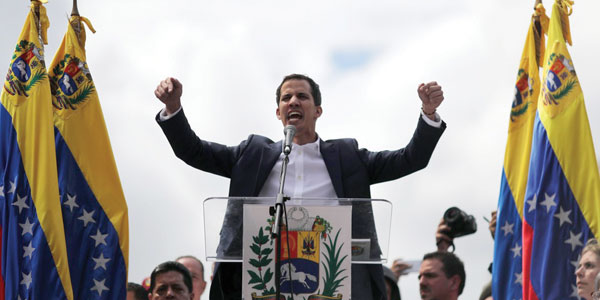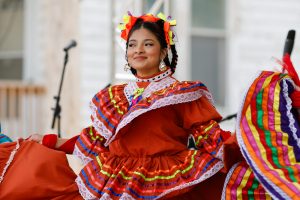
By Jorge Ramos
“For freedom I bleed, I fight, I live on.”
— Miguel Hernández, “The Man Who Lurks”
I have only words of encouragement and admiration for the millions of Venezuelans currently fighting for their freedom. There is no way of knowing for certain how the crisis in Venezuela will end, but I am quite sure I know who is holding the weapons and committing the murders. And I also know who has been in the resistance there, for 20 years now.
Venezuela is a police state, preserved with the assistance of many Cuban officers — I saw this firsthand during a recent visit. It takes a great deal of courage to go out and protest in a country where the annual inflation rate runs higher than 1 million percent, where paralyzing blackouts occur routinely, hospitals lack the necessary drugs to save lives and monthly salaries amount to just a few U.S. dollars. And those in the government who feel under attack will invariably respond with repressive measures.
That is why I am stunned by the many images of people refusing to back down on social media and television. There are times, such as last week, when I tell myself that Nicolás Maduro has been defeated. But then I hear the guns, the screams of a young man being crushed by an armored car, the motorcycles of the pro-Maduro “colectivos,” and I feel hopeless again. We are all tired of this endless roller coaster ride — moving from high hopes to utter disappointment in a heartbeat.
Still, in the morning I go back on Twitter and realize the people of Venezuela have not given up. The opposition’s successful operation to free the political prisoner Leopoldo López, after five years of jail and house arrest, is a clear sign that the regime is finally breaking down. At the same time Juan Guaidó, the self-declared interim president of Venezuela, continues to reshape what it means to be “the opposition.” For those living in a dictatorship, being able to imagine a different country is crucial.
Some might see Guaidó’s fight to oust Maduro as an attempted coup. That would be a terrible mistake. His actions are simply an attempt to put an end to a dictatorship. This fight is as legitimate as the fight against Gen. Augusto Pinochet in Chile. Or the one against apartheid in South Africa, or slavery in the United States.
Denouncing a dictatorship — from any side of the political spectrum — should be a natural urge for all who take pride in being a democrat. There is no such thing as a good dictatorship. And Maduro is a brutal dictator.
Maduro was hand-picked by President Hugo Chávez before his death in 2013. He is responsible for the deaths of hundreds of young people who took to the streets against him, according to Hugo Carvajal, the former head of military intelligence known as “El Pollo.” Data provided by the human rights organization Foro Penal shows that his government had detained 775 political prisoners as of the end of April. Human Rights Watch has documented over 380 violations of human rights, including instances of torture.
And then there are the allegations that Maduro committed electoral fraud in May 2018, by barring opposition leaders from running for office, limiting the presence of international observers and overseeing the National Electoral Council, which counted the votes. These are just facts. Maduro is anything but a democratically elected president.
Now, if you’ll forgive me, I must speak about Mexico.
The “neutral” position adopted by the administration of Andrés Manuel López Obrador on the Venezuelan crisis places him on the wrong side of history. AMLO, as the Mexican president is known, had his chance; he could have been a regional leader standing up for human rights. But he chose not to.
“We expected more,” Guaidó said in an interview with the columnist Andrés Oppenheimer. Of course one should expect more from Mexico! The fact that someone like AMLO — a man who has denounced abuses of power, killings and human rights violations for decades, and while a member of the opposition — is refusing to stand up and side with the victims is confusing and frustrating.
His lack of action is morally wrong and a terrible mistake for his government. Human rights must be defended both within and beyond a country’s borders. Always. And a stance against the abuses of Maduro doesn’t equate in any way with support for a U.S. invasion.
The Nobel laureate Elie Wiesel once said: “Wherever men or women are persecuted because of their race, religion or political views, that place must — at that moment — become the center of the universe.” Today, that place is Venezuela.
In 1498, on his third trip to the Americas, Christopher Columbus reached what is today Venezuelan territory, near Isla Margarita. He was so overwhelmed by the beauty of the place that in a letter to the king and queen of Spain, Ferdinand and Isabella, he later wrote that the “earthly paradise” must be very close.
I agree. Venezuela is beautiful and unique. Unfortunately, no place is a paradise without freedom.
__________________________________________________________________________
Para la Libertad
“Para la libertad, sangro, lucho, pervivo.”
— Miguel Hernández, “El hombre acecha”
Sólo tengo palabras de aliento y admiración para los millones de venezolanos que están luchando para ser libres. No sé cómo va a terminar la crisis en Venezuela. Pero sí sé quienes son los que tienen las armas y están matando. Y sé también quienes son los que llevan 20 años en rebeldía.
Venezuela — lo viví hace poco — es un estado policíaco apuntalado por decenas de miles de agentes cubanos. En un país con una inflación anual superior al millón por ciento, apagones, hospitales sin medicinas y un salario mínimo mensual equivalente a unos dólares, se necesita mucho valor para salir a las calles a protestar. La represión es, siempre, la reacción del que se siente amenazado.
Por eso me sorprenden tanto esas imágenes en las redes y en la televisión de gente que no se deja. Hay veces — como la semana pasada— en que pienso: Maduro ya perdió. Y luego oigo los balazos, los gritos del joven reventado por una tanqueta y las motos de los colectivos, y la desesperanza se vuelve a posar. Estamos todos agotados de este juego de altas expectativas y reveses.
Pero a la mañana siguiente leo Twitter y los venezolanos no se han rendido. El rescate y liberación del líder opositor Leopoldo López, tras más de cinco años de prisión, es una clara señal de que el régimen se está quebrando. Y mientras, el autoproclamado presidente interino Juan Guaidó sigue reinventando la manera de ser oposición. En una dictadura, es vital imaginarse otro país.
Es un grave error decir que la lucha de Guaidó para sacar a Nicolás Maduro es un intento de golpe de estado. No lo es. Se trata, sencillamente, de un levantamiento en contra de una dictadura. Tan legítimo como lo fue pelear en contra del dictador chileno, Augusto Pinochet. O contra el apartheid en Sudáfrica y la esclavitud en Estados Unidos.
Todo demócrata debería denunciar cualquier dictadura, sea de derecha o de izquierda. No hay dictaduras buenas. Y Maduro es un dictador brutal.
Fue electo presidente en 2013 y elegido como sucesor al dedazo por el caudillo Hugo Chávez antes de su muerte. Es responsable de cientos de asesinatos de jóvenes durante las protestas, según denunció su exjefe de inteligencia, Hugo “El Pollo” Carvajal. Tenía, al menos, 775 prisioneros políticos, de acuerdo con Foro Penal. Human Rights Watch ha documentado más de 380 casos de violaciones a los derechos humanos, incluyendo tortura. Y organizó un mayúsculo fraude electoral en mayo del 2018 — prohibiendo la participación de opositores antes de las elecciones, limitando a los de observadores internacionales y dejando el conteo de votos a un organismo (el Consejo Nacional Electoral) que él controla. Estos son los datos. Maduro no es un presidente elegido democráticamente. Que levanten la mano los que estén de su lado.
Y, perdón, pero ahora tengo que hablar de México.
La neutralidad que mantiene el gobierno de Andrés Manuel López Obrador en el caso de Venezuela lo pone del lado equivocado de la historia. AMLO pudo convertirse en un líder regional en defensa de los derechos humanos. Pero no quiso.
Guaidó, en una entrevista con el periodista Andrés Oppenheimer, dijo que “esperamos más” de México. ¡Claro que se espera más de México! Es muy confuso y frustrante que alguien como AMLO — quien por décadas y como opositor denunció los abusos del poder, las matanzas y las violaciones a los derechos humanos — ahora se niegue a ponerse del lado de las víctimas.
Es una falla moral y un terrible error de cálculo de su gobierno. Los derechos humanos se defienden dentro y fuera de las fronteras de tu país. Siempre. Y denunciar los abusos de Maduro no significa, de ninguna manera, apoyar una invasión estadounidense.
Aquí el Nobel Elie Wiesel: “En cualquier lugar donde hombres y mujeres sean perseguidos por su raza, religión y visiones políticas, ese lugar debe convertirse — en ese momento — en el centro del universo”. Y hoy ese lugar es Venezuela.
En el tercer viaje de Cristóbal Colón en 1498 llegó a lo que hoy es Venezuela, muy cerca de la isla Margarita. Y quedó tan impresionado de su belleza que luego les diría a los reyes de España en una carta que muy cerca de ahí “se halla el paraíso terrenal”.
Estoy de acuerdo. Venezuela es hermosísima y única. Pero no hay paraíso sin libertad.










